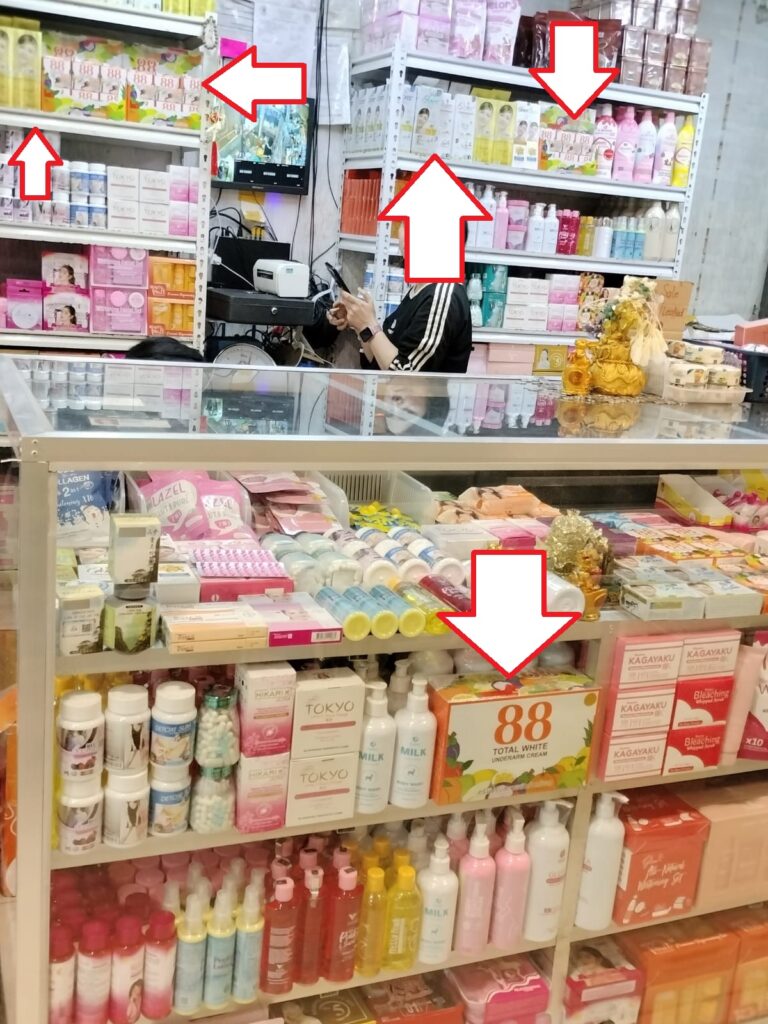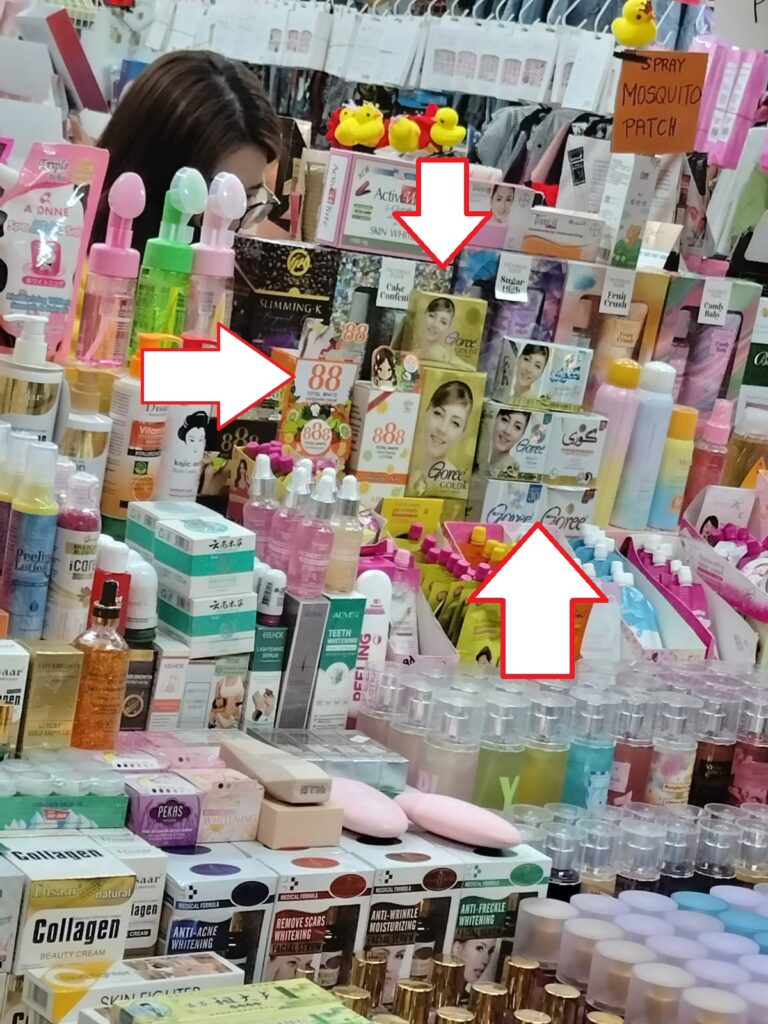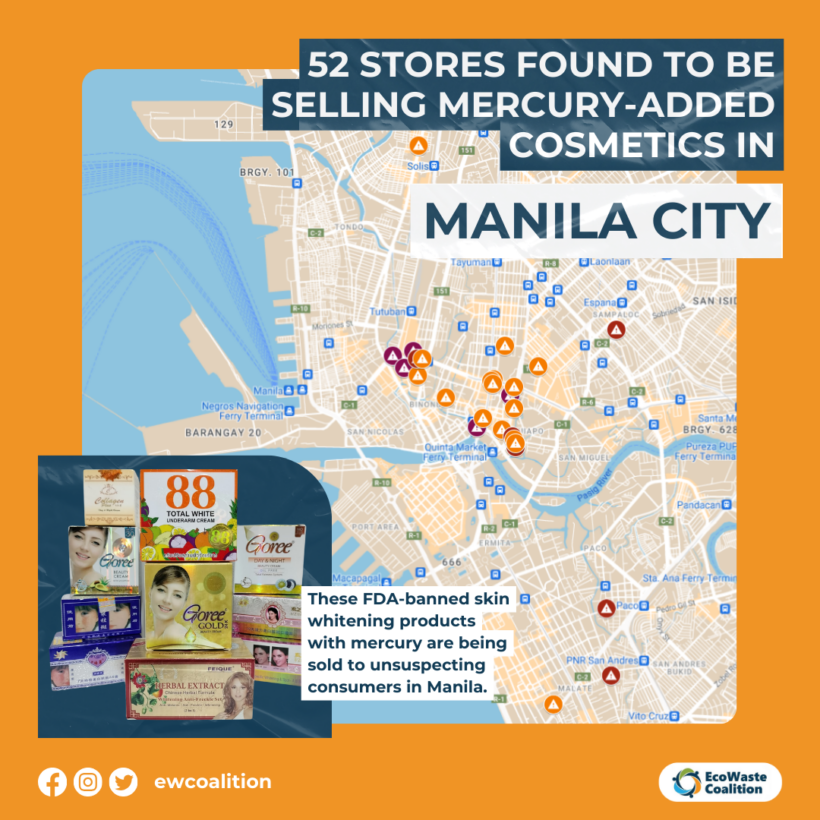5 April 2024, Quezon City. Ahead of World Health Day on April 7, the toxics watchdog group EcoWaste Coalition today provided the City Government of Manila with a map of wholesale and retail stores selling skin-lightening products laced with mercury to help the local authorities in enforcing the ban on such dangerous cosmetics.
Based on the market investigation conducted by the group from March 10 to 27, 52 stores were found selling contraband mercury-containing cosmetics for lightening the skin tone and for removing age spots, blemishes, freckles, wrinkles, and other skin woes. The Food and Drug Administration (FDA) has duly banned these unauthorized products to protect public health and the environment against mercury toxicity.

A store in Manila sells mercury-laden cosmetics despite being banned by the FDA.
Openly displayed on store shelves and sold with impunity are FDA-banned cosmetics, which can harm users and even put the health of their own families at risk of mercury exposure, including Goree Beauty Cream (three variants) from Pakistan, 88 Total White Underarm Cream from Thailand, Collagen Plus Vit E Day & Night Cream from Indonesia, and Feique, Jiaoli (2 variants) and S’Zitang (2 variants) skincare sets from China.
“Being a woman, mother, and physician, we know Mayor Lacuna is one with us in protecting consumers and their families from being exposed to mercury lurking in these skin-lightening products,” said Aileen Lucero, National Coordinator, EcoWaste Coalition. “Please make full use of the map we have created to enforce the ban on mercury cosmetics under the ASEAN Cosmetic Directive and the Minamata Convention on Mercury and uphold our people’s rights to health and a clean and toxics-free environment.”

Banned cosmetics laced with mercury are openly sold at this shopping mall in Manila.
Found selling one or more of the above-named contraband cosmetics are stores located in Quiapo (18 stores), Binondo (10), Tondo (10), Santa Cruz (5), Sampaloc (3), Malate (3), Paco (2) and Santa Ana (1).
Thirty-one of these stores are operating within well-known shopping hubs, including Tutuban Center-Main (5 stores), Victory Lacson Underpass (5), Dragon 8 Shopping Center (4), QQ Shopping Mall (4), 168 Shopping Mall (4), 999 Shopping Center (3), 11/88 Shopping Mall (1), Good Earth Plaza (1), Isetann Cinerama Complex (1), Manila City Plaza (1), Odeon Terminal Mall (1), and Zurbaran Shopping Arcade (1).
Aside from conducting immediate law enforcement operations, the EcoWaste Coalition urged the City Government of Manila to prohibit and penalize the manufacture, importation, distribution, advertising, promotion, and sale of mercury-containing cosmetics by way of an executive order or an ordinance.
The group, which has been tracking dangerous cosmetics with mercury since 2011, further requested the city government to spearhead a “Natural is Beautiful” campaign as part of its health awareness and promotion efforts to encourage all Manileños to accept and embrace their natural skin color, as well as to desist from altering their skin tone by using chemical whiteners containing mercury and other hazardous substances.
Lee Bell, Mercury Advisor for the International Pollutants Elimination Network (IPEN), which counts on the EcoWaste Coalition among its members, stated: “Mercury-added cosmetics such as skin lightening creams were banned internationally by the Minamata Convention on Mercury because they are high-risk products. Mercury is a powerful neurotoxin affecting women and children in particular. Not only do these cosmetics directly impact the person applying them, they contaminate the surrounding environment such as furnishing, bedding, towels, and clothes, causing exposure to others in the home.”
“EcoWaste Coalition has been monitoring and exposing these illegal and dangerous products in the Philippines for years, yet they still appear in many physical and online stores. Rigorous enforcement of the mercury-added cosmetic ban is well overdue and we encourage national and local government officials to take strong, immediate action against those profiting from this toxic trade,” he said.
According to the World Health Organization (WHO), “Adverse health effects of the inorganic mercury contained in skin lightening creams and soaps include: kidney damage, skin rashes, skin discoloration and scarring, reduction in the skin’s resistance to bacterial and fungal infections, anxiety, depression, psychosis, and peripheral neuropathy.”
Pregnant women, lactating women, breastfeeding babies and young children are most susceptible to mercury toxicity, and health experts have emphasized “children’s exposure to mercurial skin lightening agents at any time during development, from intra-uterine to early developmental life, can lead to severe detrimental health effects.”
References:
https://iris.who.int/
https://ijms.info/IJMS/






